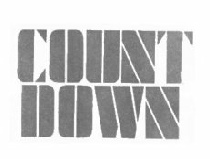
TV Pop Diaries
Pop Music on British Television 1955 -
From TV Times “A chartbusting panel show in which top popsters compete to test their knowledge of the current disc scene and sing for their supper."
Following on from Southern’s Pop The Question, this quiz show took a different direction as pop stars quizzed each other about their new releases and would in turn promote their own. But who gets to perform and when is determined by the current state of play and the outcome of a draw made by fellow celebrities in the audience. So it was assumed that the more knowledgeable of the stars will get to sing, despite all of them having rehearsed with the studio orchestra. There would also be filmed inserts of other pop acts in various locations.
This was one of a series of pop shows to be devised and directed by Mike Mansfield
for Southern, later to work on Time For Blackburn!, Supersonic, and continuing to
work up till the mid-
Presentation chores were in safe hands, Muriel Young and Don Wardell, with Young only recently vacating her job at The Five O’Clock Club on Rediffusion.
A pilot show recorded 28th January 1966 was shown locally in early April and to an audience in London on 16th May. Running in at forty minutes it featured Donovan, Dusty Springfield, Paul Jones and Dave Clark. There would be two teams, one male, one female with each made up of two pop stars and another celebrity. Questions were put to them by Muriel Young and at the end of each round a member of the audience gets to choose which act will perform by choosing an envelope offered to them by host Don Wardell, although this section was later dropped. According to Disc magazine Dusty reckoned it was "great fun" and "It was very interesting to see pop stars talking as well as singing." Paul Jones enthused "You see people talking and it shows some depth to their personality. I think it would be a very good replacement for Lucky Stars." In fact, it was briefly considered as a replacement for the show on the ITV network. Southern played the first pilot show instead of Lucky Stars and the public were asked to comment on what they thought of the show.
Two further pilots were considered for broadcast on 6th and 13th May 1966, but the next would actually be broadcast 14th June 1966 with Southern's controller of programmes' Berkeley Smith claiming "We've already experimented with Countdown in a forty minute format and the response was very encouraging. Now, with one eye on the autumn schedule, we are trying it out again in a thirty minute slot". The budget for the show was around £1400 per week.
The show returned for the first of the proper series on 1st October on Saturday afternoons, hoping to fulfil the audience that was missing Thank Your Lucky Stars, but the show was relegated by Southern to late Friday night several weeks later. The LPs that the panellists won were donated to charity.
Disc ran a report on the first show. "The basic idea behind panel games is sound.
It is that the TV viewer will always be stimulated into pitting his knowledge against
that of the panellist-
The show received scathing reviews and talking to Disc Weekly, producer Mansfield
defended the show saying "First of all, when we put on a pilot show a short while
ago we invited opinions from 10,000 viewers in the Southern TV area. And 8,500 of
them liked it." The show was due for a thirteen week run, but could be extended to
twenty-
On 18th November 1966 there were only two women on their panel as the producers couldn't find a third. Producer Mike Mansfield told Disc Weekly "There just aren't the girl singers around today. There's a tremendous shortage of good girl singers so we have had to make this change in the format although we shall revert to the three girls on the panel as often as possible."
Producer Mansfield had tried to get The Beatles to appear on the show. Talking to
Disc Weekly in late November 1966 he said "I tried for Paul but he was out of the
country. I even asked Brian Epstein if we could have all four Beatles on the show
as panellists, but he didn't want that either." He was asked in the same article
about the demise of Ready Steady Go and how that could affect his show. He replied
that the show was going "very very well." The article also mentioned the interest
America was said to have shown, but he responded "this doesn't mean I'm leaving Southern
TV -
Despite playing on various ITV channels on different days it lasted just one series. In an article for Disc Weekly at the end on 1966 Mansfield claimed the show "was originally booked in for a seven week run which was extended by a further six weeks. It was never envisaged as a marathon runner." He also tells the NME "..it seems a pity the show is being taken off at a time when our audience rating is substantially improving."
Mansfield was wasting no time in assembling his next series for Southern, As You Like It which began in March 1967.
COUNTDOWN
Southern
2nd April 1966, 14th June 1966, 1st October 1966 -
